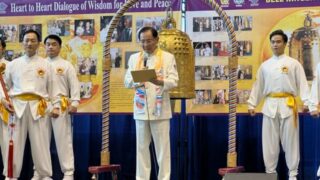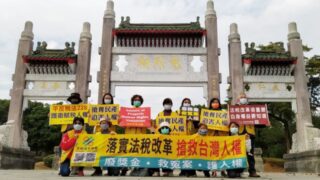Tai Ji Men dizi may find inspiration in a Polish movement named “Solidarity,” whose non-violent actions led to the end of Communism in Eastern Europe.
by Daniela Bovolenta*
*Introduction to the webinar “Learning Solidarity from Tai Ji Men,” co-organized by CESNUR and Human Rights Without Frontiers on December 20, 2023, United Nations Human Solidarity Day.


December 20 is a United Nations day of observance calling us to remember the value of solidarity. For Europeans of my generation, “Solidarity” is the name of a movement that changed history in a way that seemed unthinkable when it was founded in 1980.
“Solidarity,” in Polish language “Solidarność,” was the first independent trade union founded in a country of the Soviet bloc, where labor organizations were allowed only if they were strictly controlled by the Communist parties. Solidarność was formed among the workers of the Gdansk shipyards and quickly became a national movement, too large to be suppressed by the Polish government without risking a popular revolution.
While workers joined Solidarność en masse because of an economic crisis that made buying enough food to survive difficult, the Polish phenomenon could not be understood without considering that two years before, in 1978, the Catholic Church had elected a Polish Pope, John Paul II. Poland is a deeply Catholic country, and the social teaching of the Catholic Church was the main doctrinal reference of Solidarność. Many of us remember the images in the 1980s of thousands of men praying the Rosary or waiting in line for priests who will hear their confessions during the mass strikes organized by Solidarność.


It was the Catholic notion of solidarity and the explicit support of Pope John Paul II that motivated the Polish workers in their peaceful struggles. It was a difficult journey. The Polish government repeatedly imposed the Martial Law to make public demonstrations by Solidarność illegal. In 1981, Pope John Paul II survived almost miraculously an assassination attempt in Saint Peter’s Square in Rome. Although not everything is clear about the incident, there are now enough documents to support the conclusion that the attack had been organized by secret services of the Soviet bloc. They had perfectly understood both the role of the Pope in supporting Solidarność and the fact that the Polish movement had the potential of destroying Communism in Eastern Europe. In 1984, Father Jerzy Popiełuszko, a Catholic priest who was directly involved in the activities of Solidarność, was assassinated by three agents of the Security Service of the Polish Ministry of Internal Affairs.


But all this did not stop the peaceful protest of Solidarność. In 1989, the demonstrations led to the fall of the Communist regime, and in 1990 the leader of Solidarność, Lech Wałęsa, became the first President of democratic Poland. What had happened in Poland set in motion a series of event that caused all the Communist regimes in Eastern Europe to fall, one after the other, and the Soviet Union to collapse. It was something that in the 1970s nobody would have predicted. And it all started with a group of Polish workers who took seriously the value and ethics of solidarity preached by a Polish Pope.
While considerable violence was used by the regime against Solidarność, the movement remained consistently and admirably non-violent. It was its strength, and a key factor in its ultimate victory.


The situation of Poland in the 1980s and Taiwan today is obviously very different. Yet, the story of Solidarność is relevant for the Tai Ji Men case. Just as Solidarność did, Tai Ji Men dizi (disciples) have been able to protest for many years, without giving up when it seemed that success was impossible. Tai Ji Men dizi have been victims of different forms of violence, to which they have always opposed peaceful protests based on the principles of conscience, love, and solidarity. Like Solidarność, Tai Ji Men has gathered significant international support.
In this Human Solidarity Day, remembering the victory of Solidarność is a way of encouraging Tai Ji Men dizi by telling them that solidarity means never giving up, and that peaceful movements may change the course of history. Tai Ji Men is teaching us the power of solidarity. Let’s answer by showing our solidarity to Tai Ji Men.









